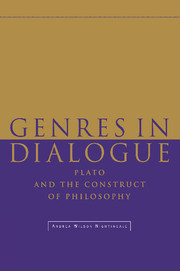Book contents
- Frontmatter
- Contents
- Acknowledgments
- Abbreviations and texts
- Introduction
- 1 Plato, Isocrates, and the property of philosophy
- 2 Use and abuse of Athenian tragedy
- 3 Eulogy, irony, parody
- 4 Alien and authentic discourse
- 5 Philosophy and comedy
- Conclusion
- Bibliography
- General index
- Index of passages from Plato
Conclusion
Published online by Cambridge University Press: 23 October 2009
- Frontmatter
- Contents
- Acknowledgments
- Abbreviations and texts
- Introduction
- 1 Plato, Isocrates, and the property of philosophy
- 2 Use and abuse of Athenian tragedy
- 3 Eulogy, irony, parody
- 4 Alien and authentic discourse
- 5 Philosophy and comedy
- Conclusion
- Bibliography
- General index
- Index of passages from Plato
Summary
… Hang up philosophy!
Unless philosophy can make a Juliet,
Displant a town, reverse a prince's doom,
It helps not, it prevails not. Talk no more.
Shakespeare, Romeo and JulietAs J. K. Davies has observed about ancient Greek thinkers,
At first sight, the philosophers and intellectuals scarcely comprise a group. Quarrelsome and individualistic, they showed little sign of cohesion, and were socially diverse and geographically scattered. Yet they came to be denoted by labels such as “sophist” or “philosopher,” which imputed some unity of role or status to them …
But how exactly did these thinkers “come to be denoted” by these labels? As I have contended, the creation of “philosophy” was not simply a matter of giving a name to a new method of inquiry and argumentation. Rather, philosophy had to make a case for itself as a discipline that offered a unique kind of wisdom which rivaled the other brands on offer. This was by no means a simple enterprise, as Plato's frequent attempts to define and legitimize philosophy clearly attest. As we have seen, Plato defined philosophy at least in part by way of the rhetoric of invective and exclusion – rhetoric which had a specific valence in the context of the social and political structures of democratic Athens. But he did not rest content with explicit definitions and denunciations. For Plato also marked the boundaries of philosophy by scripting intertextual encounters with traditional genres of poetry and rhetoric. Although Plato is famous for his quarrels with “poetry” and “rhetoric” as supergenres, his parodic attacks invariably focus on individual genres of literature.
- Type
- Chapter
- Information
- Genres in DialoguePlato and the Construct of Philosophy, pp. 193 - 195Publisher: Cambridge University PressPrint publication year: 1995



